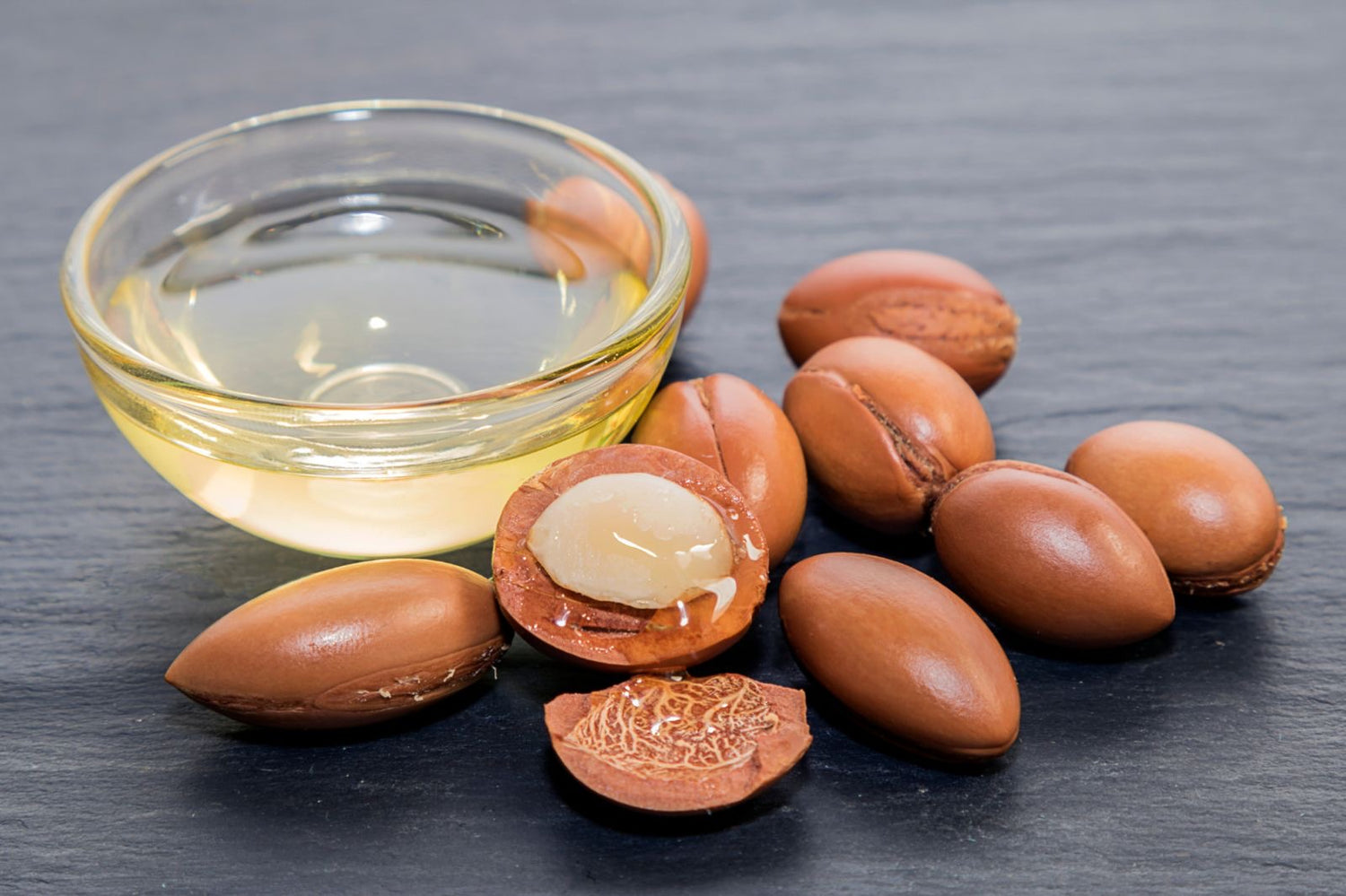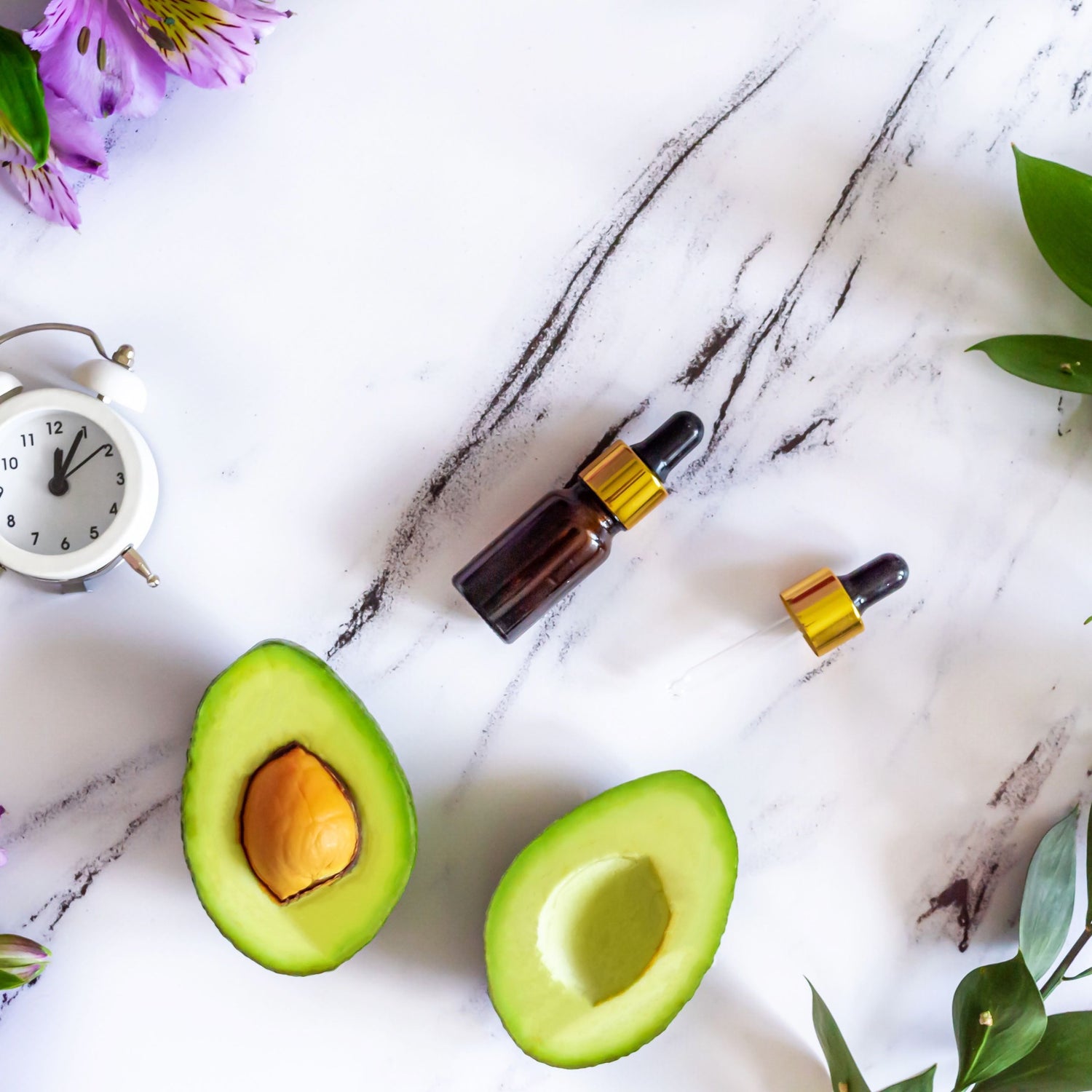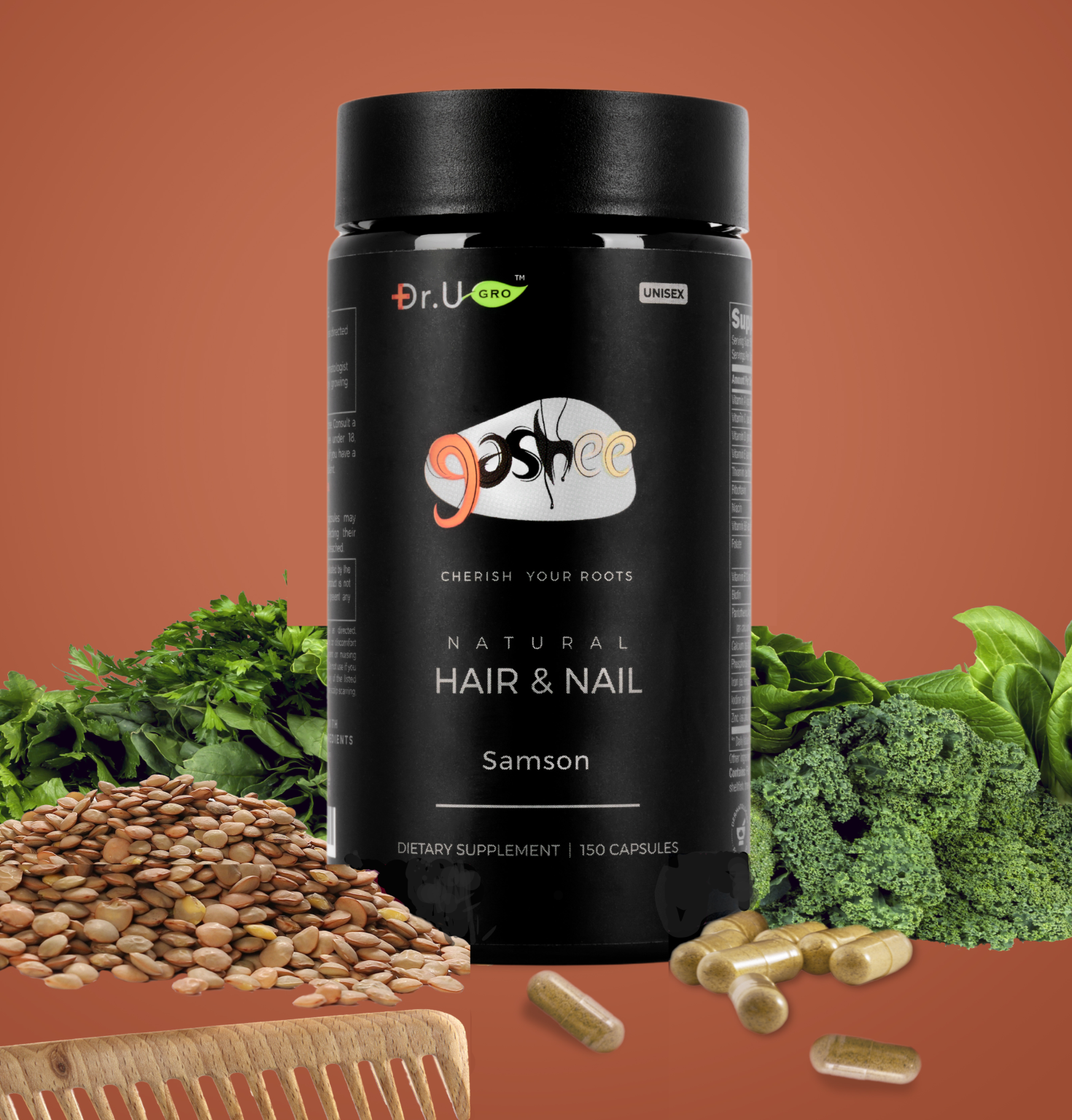Eugenol for Hair Health
Eugenol is a liquid compound, often colorless, sometimes pale yellow, which is found in various essential oils, including clove oil. It is often used in perfumes for its aromatic qualities. Several studies have demonstrated certain attributes of eugenol that could potentially benefit hair health. These include 1. Anti-androgenic effects; 2. antioxidant effects and 3. antifungal and antimicrobial qualities (1, 7, 8, 10). This article will examine the studies of eugenol for hair health.
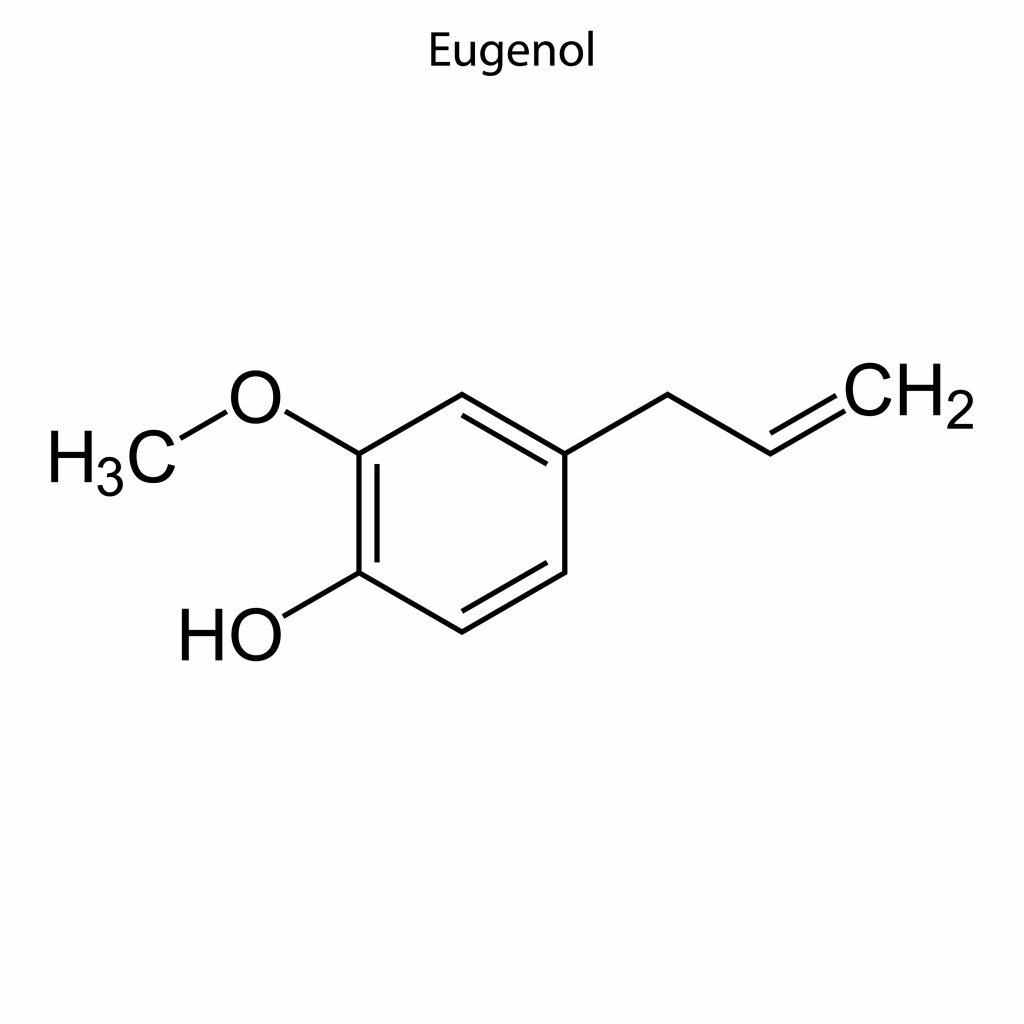
Does Science Support Uses of Eugenol For Hair Loss?
A common form of hair loss is androgenic alopecia, also known as male pattern baldness. Despite its common name, women can suffer from this condition as well. This type of alopecia is a hereditary trait in which some people have more sensitive androgen receptors on their hair follicles. These receptors are susceptible to the byproduct of testosterone breakdown, dihydrotestosterone (DHT). As DHT binds to the androgen receptors on hair follicles, the follicle shrinks and, over time, disappears, resulting in hair loss (12).
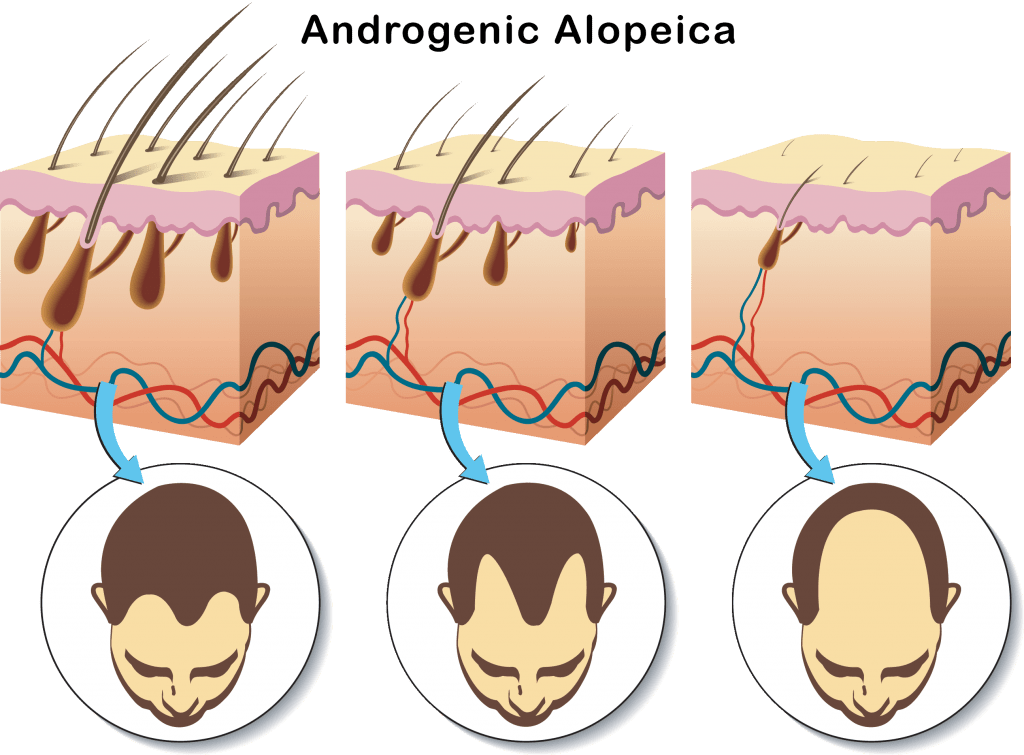
Eugenol as an Inhibitor of DHT
One study that measured the ability of herbal extracts to block the secretion of oil from sebaceous glands found that several were potent blockers of 5α reductases, the enzyme that sebum secretion hinges on. Licorice extract showed the most potency in inhibiting the uptake of 5α reductases. This enzyme is also responsible for the conversion of testosterone to its byproduct, DHT. Clove extract and Peppermint extract also displayed effectiveness in inhibiting this enzyme from converting testosterone to DHT (13). Lower levels of DHT in the bloodstream can potentially minimize the risk of follicular miniaturization. The effectiveness of clove extract in inhibiting 5α reductases in this study gives rise to a new set of questions: namely, can topically applying eugenol found in clove oil for bald spots reverse hereditary hair loss? Further research must examine and re-examine the effect of eugenol as a 5α reductase blocker to measure the effect of lower DHT levels in the bloodstream.
Eugenol for Hair Health: Using Clove Oil Eugenol Extract For Hair Health as an Androgen Receptor Antagonist
A study in the Bioorganic & Medicinal Chemistry Letters used an MDK-kb2 human breast cancer cell line to investigate the effect of essential oils on androgen activity (9). The effectiveness of eugenol in inhibiting androgen receptors was measured at 19µm, which was the highest of all the essential oils, including raspberry ketone.
Observing Antioxidizing Potency of Eugenol Derivatives: Eugenol for Hair Health
Several studies have examined the effect of antioxidants concerning hair health and strength (4). Antioxidants can be beneficial for hair growth due to their ability to protect follicles (6). Free radicals are highly reactive compounds caused by oxidative stress that can damage cell structures, including hair follicles. This oxygen metabolism can potentially speed up the process of aging and hair loss (6). More recent studies have found eugenol to contain high levels of antioxidants (5). Antioxidants are molecules that are capable of preventing free radicals from damaging cell structures (6). Scientists have already researched the high levels of antioxidants in eugenol; one study goes a step further and examines the potency of eugenol chemical derivatives to see which one is more potent at neutralizing free radicals (7). Through its antioxidant properties, eugenol has the potential to help preserve hair health and strength from free radicals. The use of eugenol for hair strength has also been examined about fungal infections.
What Studies Show About Eugenol in Hair And Scalp Fungal Infections
Any cause of scalp inflammation can provoke or exacerbate hair loss. A widespread cause of scalp inflammation is dandruff. It is widely accepted that the fungal yeasts Malassezia globosa and Malassezia furfur play a significant role in causing dandruff. Preventing or treating fungal scalp infection would be beneficial to scalp and hair health. A study in the Journal of Pharmacobio-Dynamics measured the antifungal effect of eugenol and nerolidol in a guinea pig model (8). The guinea pigs were infected with Microsporum gypseum, and improvement was measured via skin lesion scoring, hair cultures, and skin tissue examination. It was found that a concentration of 10% Eugenol has certain antifungal properties. An antifungal would be beneficial for hair health, as it could fight inflammation that would otherwise destroy hair follicles. In addition, the guinea pigs treated with eugenol and nerolidol had a lower level of hyperkeratosis and inflammatory cell infiltration. Hyperkeratosis is the body’s defensive response to fungal infections to avoid compromising the structure of the layers of the skin. It results in abnormal skin thickening. Inflammatory cell infiltration, on the other hand, is the cellular response to harmful microbes and pathogens. These findings prompted the study to conclude that “eugenol and nerolidol could apply supplementary antifungal agents” (8). Antifungal agents can protect follicles from being damaged by inflammation, which would be beneficial for hair health.
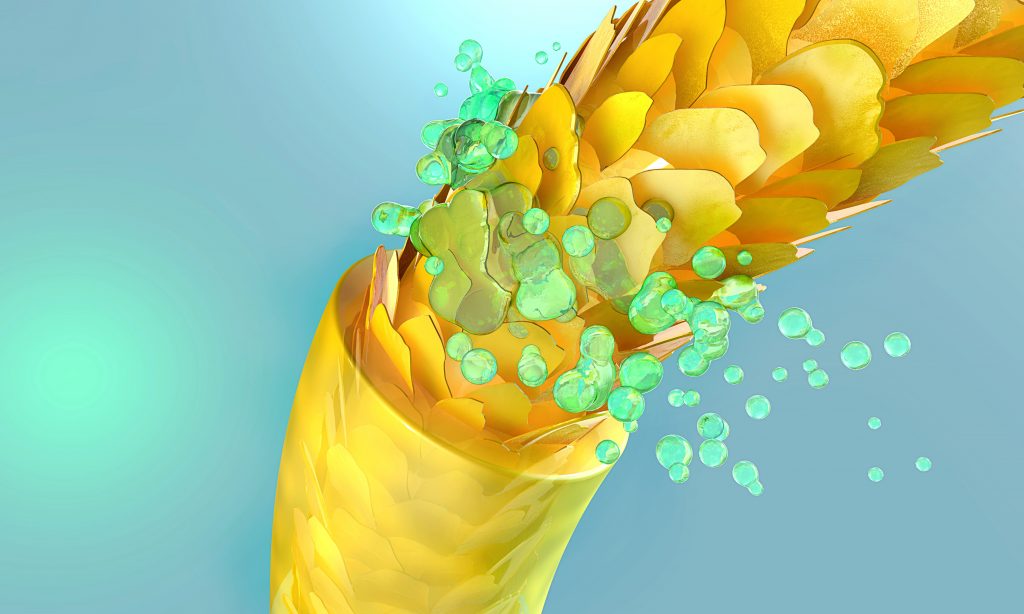
Eugenol Hair Health Benefits Through Antifungal and Antimicrobial Effects
Piedra (Spanish for “stone”) is a fungal infection of the hair shaft in which penetration of the outermost layer of the follicle weakens the shaft, often to the point of breakage. In a study evaluating the antifungal activity of 25 essential oils in response to Piedra hair infection, five were found to be highly effective. These five were:
- Cinnamon oil
- Citronella oil
- Tea tree oil
- Peppermint oil
- Eucalyptus oil
Eugenol was a major component (60.68%) of the Cinnamon oil analyzed. The major constituents of the other oils were Geraniol, Terpinene-4-ol, Isomenthol, and 1,8 cineole, respectively (10). Another study tested the ability of two fungi to penetrate hair (Microsporum gypseum and Trichophyton vanbreuseghemi) to penetrate the outermost layer of the hair shaft (8). 17 oils were tested, and only three were found to be effective at stopping both fungi from tearing into the hair shaft. These oils were:
- Clove oil
- Olive oil
- Turpentine oil
As the main bioactive compound in cloves, Eugenol can boast a concentration of up to 89% in clove essential oil (2). The results of the studies above may explain the scientific interest in eugenol for hair strength. An inverse relationship is often made between hair health and hair loss, which prompts the question, are there effective uses of eugenol for hair loss? To begin answering this question, future research should differentiate between hair loss due to genetics, chemicals/hairstyles, and immune responses and investigate the effect on the mechanisms of each.
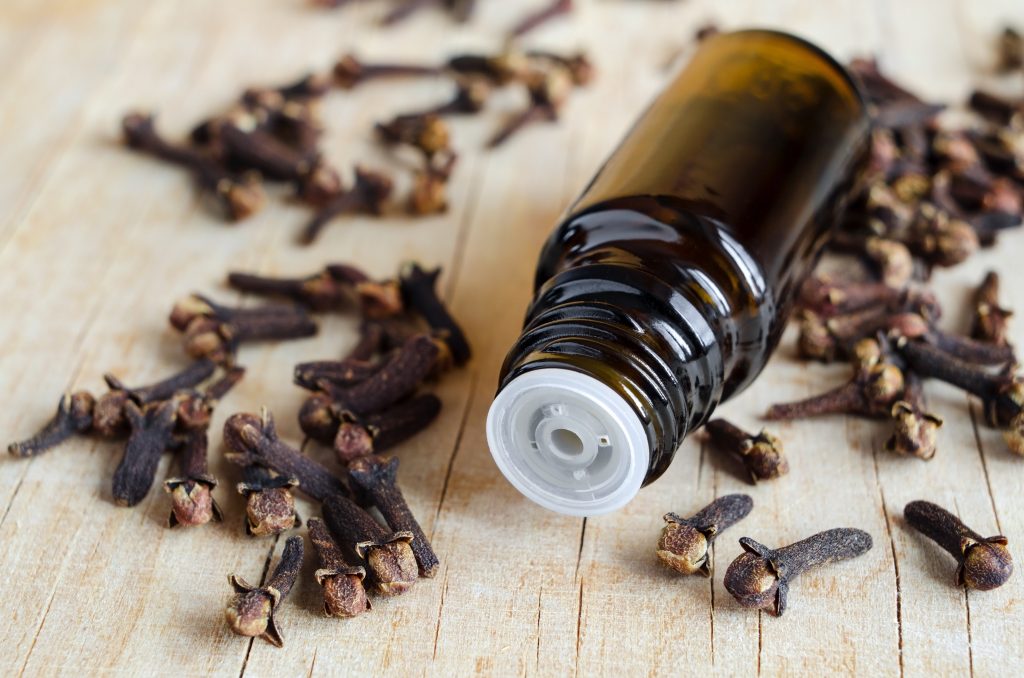
Antimicrobial Activity Examined in Eugenol and Other Essential Oils
A 2012 study conducted at the University of Buenos Aires, Argentina, measured the antimicrobial activity of clove essential oil by analyzing the bacteria population. By evaluating temperatures and concentrations at which these populations decreased, it was found that the high concentration of eugenol within the clove oil was responsible for its potent antimicrobial activity (7). An antimicrobial is a classification of a substance that kills or inhibits the growth of a microorganism without causing major damage to the host. A 2009 study published in the Journal of Trichology examined the cause and development of fungal infections in hair due to microbial agents such as dermatophytes and those that cause piedra. The study initially states the rising importance of diseases of the hair caused by fungi (trichomycoses) due, in part, to the cosmetic impact of hair loss (11). Therefore, antimicrobial agents would be useful in protecting hair from these harmful microorganisms. The study examining eugenol clove essential oil benefits concluded that “clove essential oil can be considered as a potential antimicrobial agent” (7). This potential for disease resistance has been observed in other studies (1, 8, 10).
Does Eugenol Have Health Risks?
Though eugenol is mostly safe to use in normal doses, it can negatively affect when taken in large amounts. It is possible to overdose on eugenol, so it’s important to consult with your doctor to discuss the dosage. Some side effects can include hypersensitivity reactions, irritation, and cytotoxicity. The Environmental Working Group scored eugenol a 3-5 (orange) on its safety hazard scale, depending on its usage. Although it is designated as safe to use, it is an allergen in the human immune system.
Effective Hair Growth Pomade with Eugenol
Dr.UGro Gashee Natural Botanical Hair Pomade is formulated, tested, and approved by Dr. Sanusi Umar, a dermatologist and hair transplant specialist. Using a blend of herbal extracts and eugenol, it is produced through a cold formulation process to avoid the destructive effects of heat. This pomade is effective for deeply nourishing and promoting hair growth to ensure your maximum hair health. The formula is ideal for all individuals across all ethnic groups and ages with hair concerns. It is especially effective for those suffering from hair loss caused by braids, dreadlocks, weaves, and other tight hairstyles.
Frequently Asked Questions about Eugenol
What is eugenol used for?
Eugenol has been used for its spicy aroma in perfumes and its antiseptic and anti-inflammatory qualities by some dentists. Recent research conducted on the microbial, antifungal, androgen receptor antagonist properties of essential oils has piqued further interest in the use of eugenol for hair strength.
What eugenol are properties beneficial for hair health?
Researchers note the extraordinary concentration of antioxidants in Eugenol. Researchers have also noted antioxidants' ability to neutralize free radicals, which have been linked to hair health (2, 3, 4). Antioxidants help hair follicles by protecting them from these volatile molecules that would otherwise speed up the aging process. Additionally, studies have shown eugenol to manifest antimicrobial and antifungal properties, especially against organisms known to have damaging effects on hair (1, 8, 10). Antimicrobial activity reduces the risk of follicle-damaging inflammation.
Will clove oil for bald spots work if it has eugenol?
Applying clove oil on the scalp — whether used in a high concentration of eugenol or not — is not a guaranteed method of reversing hair loss. Although studies have shown that eugenol suppressant activity towards androgen receptor uptake of DHT (The cause of androgenetic baldness), these studies are not conclusive (9, 13).
References
Bahuguna, S., and R. K. S. Kushwaha. "Influence of different oils on the penetration of human hair by fungi." International Journal of cosmetic science 15.1 (1993): 1-5Cortés-Rojas, Diego Francisco, Claudia Regina Fernandes de Souza, and Wanderley Pereira Oliveira. "Clove (Syzygium aromaticum): a precious spice." Asian Pacific journal of tropical biomedicine 4.2 (2014): 90-96.
d'Avila Farias, Marília, et al. "Eugenol derivatives as potential anti‐oxidants: is phenolic hydroxyl necessary to obtain an effect?." Journal of Pharmacy and Pharmacology 66.5 (2014): 733-746.
Fernández, Estibalitz, et al. "Efficacy of antioxidants in human hair." Journal of Photochemistry and Photobiology B: Biology117 (2012): 146-156.
Gülçin, İlhami. "Antioxidant activity of eugenol: A structure-activity relationship study." Journal of medicinal food 14.9 (2011): 975-985.
Herrling, Thomas, Katinka Jung, and Jürgen Fuchs. "The role of melanin as a protector against free radicals in the skin and its role as a free radical indicator in hair." Spectrochimica Acta Part A: Molecular and Biomolecular Spectroscopy 69.5 (2008): 1429-1435.
Nuñez, L., and M. D'Aquino. "Microbicide activity of clove essential oil (Eugenia caryophyllata)." Brazilian journal of microbiology 43.4 (2012): 1255-1260.
Lee, Sook-Jin, et al. "Antifungal effect of eugenol and nerolidol against Microsporum gypseum in a guinea pig model." Biological and Pharmaceutical Bulletin 30.1 (2007): 184-188.
Ogawa, Yoshihisa, et al. "Effect of essential oils, such as raspberry ketone and its derivatives, on antiandrogenic activity based on in vitro reporter gene assay." Bioorganic & medicinal chemistry letters 20.7 (2010): 2111-2114.
Saxena, Seema, Veena Uniyal, and R. P. Bhatt. "Inhibitory effect of essential oils against Trichosporon ovoides causing Piedra Hair Infection." Brazilian Journal of Microbiology 43.4 (2012): 1347-1354.
Sentamilselvi, G, C Janaki, and Sundaram Murugusundram. “Trichomycoses.” International Journal of Trichology 1.2 (2009): 100–107. PMC. Web. 24 Jan. 2018.
Sinclair, Rodney D. "Male androgenetic alopecia." Journal of Men's Health and Gender 1.4 (2004): 319-327.
Uchiumi, Y., S. Yamamoto, and K. Mizutani. "Activity of herbal extracts on the control of sebum secretion." FRAGRANCE JOURNAL 32.3 (2004): 53-57.




